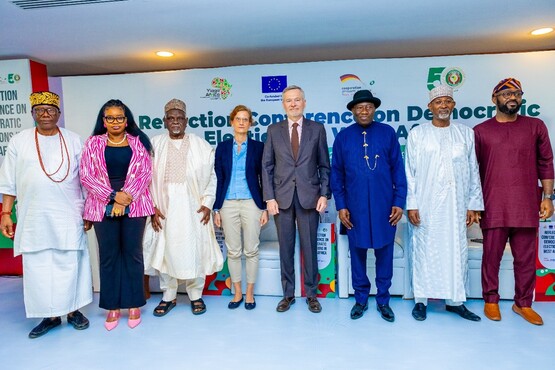EPSG, Yiaga Africa Mobilises Stakeholders towards enhancing Democratic Elections in West Africa: Key For Global Social Stability and Peace.

L-R: Prof. Nnamdi Aduba (Yiaga Africa Board Member); Cynthia Mbamalu (Director of Programmes, Yiaga Africa); Prof. Abdullahi Abdu Zuru, (National Commissioner, INEC); Dr Karin Jansen (Head of Development Cooperation from the German Embassy); H.E. Gautier Mignot(EU Ambassador to Nigeria and ECOWAS); H.E. Dr. Goodluck Ebele Jonathan (former President of Nigeria); Prof. Attahiru Jega (former INEC Chairman); Samson Itodo(Executive Director of Yiaga Africa) © GIZ EPSG
From 25 – 26 February 2025, The German Development Cooperation and Yiaga Africa convened a two-day reflection conference on democratic elections in West Africa. Titled "Strengthening Democratic Processes in West Africa: Lessons from the 2023 and 2024 Elections and Prospects for Future Elections," the event brought together key stakeholders to assess recent electoral processes and explore strategies for enhancing democracy in the region.
The conference was organized with the support of the EU Support to ECOWAS in Peace, Security, and Governance (EPSG) Project, a joint initiative co-financed by the European Union (EU) and the German Federal Ministry for Economic Cooperation and Development (BMZ). The EPSG Project is co-implemented by Deutsche Gesellschaft für Internationale Zusammenarbeit (GIZ) GmbH, Expertise France, and the Spanish Fundación Internacional y Para Iberoamérica de Administración y Políticas Públicas (FIIAAP).
Key stakeholders convened to assess recent elections and chart a path for future electoral reforms. The event featured His Excellency Dr. Goodluck Ebele Jonathan, Former President of Nigeria, as the Special Guest of Honor, while Prof. Attahiru Jega, former Chairman of the Independent National Electoral Commission (INEC) delivered the keynote address.
Speakers emphasized that a resilient democracy requires continuous dialogue, reform, and unwavering support from international partners, particularly the EU and Germany, to strengthen electoral integrity in West Africa. They underscored that active citizen participation, freedom, and diversity are the pillars of democracy—yet political interference continues to threaten the independence of electoral bodies. To ensure credible elections, ongoing civic education, strong civil society advocacy, and greater institutional support for electoral management bodies are essential. While technology has the potential to enhance transparency, experiences from Nigeria’s 2023 elections highlighted challenges, contrasting with smoother electoral transitions in Ghana and Liberia.
In their goodwill messages, EU Ambassador Gautier Mignot and Dr. Karin Jansen, Head of Development Cooperation at the German Embassy, reaffirmed their commitment to building resilient and inclusive electoral systems. They emphasized that safeguarding the independence of Electoral Management Bodies (EMBs) and addressing security challenges are critical to preventing democratic backsliding in the region. This initiative plays a key role in fostering global social stability and peace.
The two-day event featured six dynamic panel sessions, exploring key themes such as lessons from the 2023 and 2024 elections in West Africa, electoral integrity and voter participation, the role of technology in elections, information integrity, judicial oversight of election systems and outcomes, and the link between elections and governance. These discussions provided valuable insights and actionable recommendations for strengthening democratic processes in the region.
Key takeaways from the conference emphasized that human factors continue to pose significant challenges to electoral processes, despite ongoing reforms and technological advancements. Speakers stressed the importance of protecting Electoral Management Bodies (EMBs) from political interference and ensuring strong oversight of electoral technologies to safeguard credibility. Additionally, the discussions underscored the need for continuous engagement with civil society, political actors, and development partners to drive meaningful reforms and promote credible, fair, and peaceful elections across West Africa.
Looking ahead, participants pledged to implement the conference’s recommendations and foster collaborative efforts to strengthen electoral systems and democratic governance in West Africa, ensuring greater credibility and transparency in upcoming elections.
Author: Amy Gukas